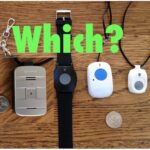By: Editorial Team | Posted: February 12, 2019 | Updated: February 13, 2025
This page contains specific medical alert recommendations for a specific type of person: one that fits a “persona” we call the “Slow Go” persona. These recommendations were updated in Feb. 2025.
If you are not sure if this is the right persona for you, start at our Medical Alerts: Just Tell Me What to Buy page (or review all the Medical Alert Personas).
The “Slow Go” Persona. (Persona B)
Needs some oversight to keep safe.
This is the person who is noticeably starting to slow down. Perhaps they have some early signs of cognitive decline, such as memory lapses. Or perhaps they are physically frail and need a walker to get around. Or have become prone to tripping.
Mostly, these people get along fine. But the risks that something bad might happen in such a persona start to grow progressively as their physical or mental condition declines. In some cases, these individuals would benefit from increased help in the home but cannot afford it (or, can afford it but refuse to consider having “a stranger” in the home).
Older people who have a history of falls or a medical condition that leads to poor balance/coordination or impaired vision fit this persona.
Medical Alerts for the “Slow Go” Persona
The big picture
For this persona, the big question is whether it is better to have a medical alert that can “go anywhere” or whether it is sufficient to have one that works only “at home“.
Generally, people who fit this persona are still fairly active and do indeed go out and about. And for those people we usually recommend one of the mobile medical alerts.
However if the person is largely home-bound or rarely goes out without a companion, then a medical alert system that works only “at home” is probably fine.
The situation where it really makes sense to recommend an “at home” system is when the person is rarely out and about alone. And in addition, when the person is likely to have trouble with the regular charging that is required by the mobile alerts.
Many of the “at home” systems have batteries that last for many months. While most of the mobile alerts need charging daily (or at best every few days). So if charging is going to be a challenge, the “at home” systems are better. But the down side, of course, is that they work only in and around the house (usually including the garden).
For people with this persona, we think it makes sense to have an automatic fall detection “feature” in the medical alert. Most mobile alerts and most “at home” medical alert systems have this as an option, although you often need to ask for it and pay extra.
Most of the Smartwatch as Medical Alerts in 2025 also have this fall detection feature. For many people in this persona category, a smartwatch medical alert is also a good choice, although make sure the complexity of the interface is not too daunting.
(Not sure what all the terms above mean? See our Tutorial: The Basics of Medical Alert Systems)
Will You Wear It?
There is a lot of discussion about which medical alert is more “perfect”. But in many ways, what matters most, especially for this persona, is whether people will actually wear the product.
This is an important issue for many people who fit this persona. They may be slowing down a bit. But they often still care a lot about looking stylish.
The key thing to look at here is the form factor of the medical alert. Many of them come in the form of pendants. Some come in the form of a button on a wrist band. You need to decide if one or other of these would be more likely to get worn all the time.
For technological reasons, the pendants can incorporate an automatic fall detection, whereas the wristband products from conventional medical alert vendors often can not. So, if you want automatic fall detection, you most likely need a pendant form factor.
As of 2024, medical alert smartwatches are an exception to this statement, as many of them incorporate fall detection (on the wrist).
Finally, the mobile medical alert products are usually a bit bigger and bulkier than the “at-home” products, and that may impact your desire to wear it at all times. Unfortunately the “smallest” pendants are those that work only “at home” (OK) and do NOT include automatic fall detection (not so OK).
So, as you look at the recommendations below, think hard about whether you will or will not wear the product. It is especially important to wear it at times like when you are in the bathroom or shower, as that is when many accidents happen.
Specific Recommendations
NOTE: We are intentionally limiting this page to “recommendations” without too much about the background or testing. If you want to see all the gory details, view the Medical Alert Reviews page for individual product reviews and some “Best of Breed” articles.
Based on the “big picture” above, you should decide whether a “mobile medical alert” or an “at home only” medical alert will suit you best. Below are recommendations from each category.
Mobile Medical Alert Category
Here is what we recommend within the mobile medical alert category.
UPDATE Dec. 2023: There have been some changes in the mobile medical alert landscape since we wrote this page, and we have not reviewed all the new products. While we think the products below are still good, there may be newer ones that are even better.
So, we no longer recommend a “best” product in this category.
If you are not sure where to start, we like the product families offered by the vendors: Bay Alarm Medical, Medical Guardian, and Lively. Just be sure to focus on a mobile medical alert and not one of the variety that only work while you are at home.
Also, for this category of people in 2024, we think it is well worth looking at one of the simplified medical smartwatches, some of which are offered by the vendors above.
At Home Category
This is the “traditional” category of medical alert devices. There are actually a relatively small number of different products, manufactured by a handful of manufacturers, that are then rebranded and resold by other medical alert vendors.
Many of the products are relatively similar. Service and the responsiveness of the monitoring services is an important consideration in selecting.
We don’t really have a “best of” recommendation in this category. We like the vendors MobileHelp, LifeFone, Medical Guardian, and Bay Alarm Medical, and have had good experiences in our tests with all these vendors (in terms of service and quality of the monitoring service). We like Lively a lot too, but they don’t have a conventional “at home” product.
We no longer recommend specific “at-home” products, as we are focusing our research on more “leading edge innovation”. But browsing the websites of the vendors above is the place to start.
One of the downsides of the “at home” category is that most of the products in this category communicate with you via a speaker in the “base station”.
If you live in a small apartment this is not a big deal, as you can hear that from wherever you are. But in a big house, this can mean that after you have an emergency and press the button, the operator will be yelling at you from the base station but will not be able to hear your response. This can lead to false alarms on occasion.
Ideally, the operator would communicate via a speaker in the pendant. This is what we call “voice through the wearable”. Unfortunately most of the “at home” products do not include this feature, and those that do have a somewhat larger pendant. (All the mobile medical alerts do have this feature, which is one of their advantages).
Need A Different Persona?
Medical Alerts: Just Tell Me What to Buy!
Buying these Products
Below are links to our “review” page for each of these products, on which are a lot more details about our evaluation. The review pages also include links to the company’s websites, where you can acquire the products if you wish. These reviews are of individual smartwatch medical alert products.
We have negotiated “discounts” with some vendors exclusively for readers of Tech-enhanced Life. See the individual reviews for details and discount codes.
*Disclosure: The research and opinions in this article are those of the author, and may or may not reflect the official views of Tech-enhanced Life.
If you use the links on this website when you buy products we write about, we may earn commissions from qualifying purchases as an Amazon Associate or other affiliate program participant. This does not affect the price you pay. We use the (modest) income to help fund our research.
In some cases, when we evaluate products and services, we ask the vendor to loan us the products we review (so we don’t need to buy them). Beyond the above, Tech-enhanced Life has no financial interest in any products or services discussed here, and this article is not sponsored by the vendor or any third party. See How we Fund our Work.


Is there a reliable device
Is there a reliable device that will function when no cell service is availability (Sierra foothills)?